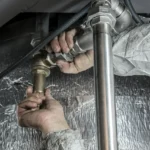If you want your upcoming move to go off without a hitch, it is imperative that you conduct adequate research before entering into a binding agreement with a moving company. When you choose reputable local movers, they will look after you and your belongings from the moment you make the initial phone call until the very last box is unloaded. This means that you won’t have to worry about anything during this process.
1. Do Some Investigations
Investigate the moving business and read evaluations written by their previous clients. It is essential to find a business that has a solid reputation and can be relied upon if you want to be confident that your goods are handled carefully and transported to their final location without incident.
2. Get an In-Home Estimate
Get a home visit for the estimate. A lot of moving firms will come to your house to give you an estimate so you can have a better sense of how much your move will cost. This is an excellent opportunity to ask questions and get any worries you might have clarified, so take advantage of it!
3. Understand the Terms and Conditions of the Contract
It is important that you fully comprehend the terms and conditions of the contract. Before you put your signature on the dotted line, double check that you have a complete understanding of the contract’s terms and conditions, including any fees or charges that might not be immediately evident.
Related: Tips for Packing Antiques and Valuables
4. Make a List of Items That will not be Moved
Create a list of the things that will not be moved in any circumstance. There may be some objects, such as fragile or emotional items, that you do not want the movers to handle throughout the moving process. Create a list of these things, then make a plan for how you will transport them individually.
5. Prepare Your Home for the Move
Get your house in order before the move. This involves putting all of your stuff into boxes, disassembling any large pieces of furniture, and ensuring that everything is set up and ready for the movers to load onto the truck. It is also a good idea to have a clear path for the movers to follow, as well as to clear any impediments or tripping hazards that may be present. These are both things that should be done.
6. Compare Quotes from Multiple Moving Companies
Compare quotes from multiple moving firms. To ensure that you are getting the best value possible on your move, it is a good idea to seek estimates from a number of different moving firms. Make sure that you compare not only the price but also the services that are included as well as any other fees or charges that may apply.
7. Get Insurance for Your Move
Ensure that your move is covered by insurance. Purchasing moving insurance will provide you peace of mind and protect you in the event that an accident or damage occurs while you are in the process of moving. Be sure that you are familiar with the terms and circumstances of the insurance coverage, as well as the things that are covered by it.
8. Make Arrangements for Transportation to Your New Location
Prepare for your move by making the necessary transportation arrangements. It is possible that you will need to make transportation plans to get to your new site if the distance that you are moving is significant. This can involve making reservations for flights or renting a vehicle.
9. Set Aside Important Documents and Valuables
Set aside vital documents and valuables. Important papers and documents, including as birth certificates and passports, as well as valuables, such as jewellery and family heirlooms, should be kept separate from the rest of your stuff and should be transported in a carry-on bag or a personal vehicle at all times.
10. Notify Relevant Parties of Your Move
Notify those who need to know about your relocation. Be sure to inform the post office of your new address, as well as any banks, credit card companies, or other institutions that might require your previous address to contact you at your new one, as soon as possible. It is possible that you will also need to advise your employer, as well as any schools or childcare providers, that you will be relocating.
11. Determine the Size of the Moving Truck You will Need
First things first: figure out how big of a moving vehicle you’ll need. It is crucial to get a general idea of the size of the moving truck you will need in order to carry all of your goods, so that you can budget accordingly. This will assist you in selecting the best moving company and ensuring that you have adequate space for everything during the relocation process.
12. Pack a Moving Day Essentials Box
Prepare a box containing moving day necessities. This should contain everything that you will require on the day of the move, like as food, beverages, tools, and any critical documents or valuables that you may have. You should either keep this box with you at all times in your personal vehicle or bring it along with you on the moving truck.
13. Label your Boxes Clearly
Clearly label each of your boxes. Be sure to identify all of your boxes with the contents of the box as well as the room in your new home in which the box should be placed. This will make it simpler for the movers to unload, and it will also make it easier for you to unpack and get acclimated in your new house as fast as possible.
14. Arrange for Someone to Look After Your Pets
Make plans for someone else to care for your animals while you are away. If you have animals at home, it is important to make arrangements for someone to take care of them while you are moving. This person could be a friend, a member of the family, or a professional pet sitting service.
15. Consider Hiring Professionals to Handle Specialty Items
When dealing with specialised materials, you might want to consider employing expertise. If you have objects that are cumbersome to move or enormous in size, such as a piano or a pool table, you might want to think about hiring movers who specialise in handling these kind of items. These professionals have the necessary tools and knowledge to properly transport these belongings, and they can also assist you in ensuring that they reach your new residence in the same condition in which they left it.
16. Have a Plan for the First Few Days in Your New Home
Create a schedule for the first few days that you will be living in your new house. This may include making arrangements for meals, locating temporary storage for your items, and, if necessary, setting up a temporary sleeping area.
17. Make a List of Items that will Need to be Replaced
First things first: compile a list of everything that will need to be replaced. It is not uncommon for items to be misplaced or broken throughout the process of relocating. You should prepare a list of things that will need to be updated before you move into your new house, such as light bulbs and shower curtains, so that you can go shopping for them as soon as you get there.
18. Consider the Weather When Planning Your Move
When making plans for your move, you should take into account the weather. Be sure to adjust your moving plans properly if you are going to be moving during a particularly warm or cold season of the year. This may involve bringing along additional blankets or stowing your winter attire in a location that is convenient for quick retrieval.
19. Set Aside Some Cash for Unexpected Expenses
Put some money aside each week to cover any unforeseen costs. Moving can be unpredictable, so it is a good idea to have some cash set aside for unanticipated expenses that may arise during the moving process. Some examples of these charges include the need for last-minute packing supplies or unforeseen fees associated with travel. This might be helpful in ensuring that you are prepared for any issues that may occur during the process of moving into your new home.



